Interview: Kyle Secor (Homicide: Life on The Street, Veronica Mars, Commander in Chief)
He gets very candid about the wild behind the scenes culture of Homicide and talks about his relationships with co-stars that included Richard Belzer, Andre Braugher, and Yaphet Kotto.
It was a thrill to talk with Kyle Secor, best known for playing Detective Tim Bayliss on 90s cop show Homicide: Life on The Street. If you ask any serious TV critic, they will all regard Homicide as one of the handful of US network shows that paved the way for the late 90s/early 00s rise of prestige cable dramas.
Without Homicide, you certainly don’t have dramas like The Wire and The Shield, for example.
It isn’t quite true to say that nobody watched Homicide back in the day, but it also wasn’t a huge hit like ER or NYPD Blue. But in the years since the show finished up, consensus around the show solidified and word of its greatness grew. But the show was never available for streaming, so it is a show that built a fan base 30 years ago, who have since been shaking their walking cane at any young whippersnapper who will listen.
In August, the show finally got released on Peacock in the US, with the show now being sold to international streaming services.
It was an absolute thrill to connect with Homicide: Life on The Street star Kyle Secor. As Det. Tim Bayliss, he was the entry point into the series for viewers. Secor was one of the few actors to stay with the show from the beginning and through to the final episode.
You may also have seen Kyle Secor as Jake Kane in a recurring role on Veronica Mars, in The Purge: Election Year, in a recurring role as the villainous Icicle in The Flash TV show, or as the First Gentleman opposite Geena Davis in Commander in Chief.
(You may also know him as one of the antagonistic cowboys in the Billy Crystal movie City Slickers. Frustratingly, in this incredibly-long chat, I neglected to ask about that one.)
Secor currently writes the Substack newsletter Everything/Nothing with Kyle Secor, filled with remembrances of Homicide. He has also just launched a rewatch podcast Homicide: Life on Repeat alongside co-star Reed Diamond.
Our chat ran just under an hour and below is a slightly modified transcript of the conversation (edited for clarity). You can watch the interview in full here:
DAN BARRETT: When I started watching Homicide: Life On The Street, I was about 14 or 15. It was one of the first proper adult TV shows that I was watching and I kind of thought that all adult, grown-up storytelling was going to be as good as Homicide: Life on the street. I was very disappointed as I got further into life to realise that no, Homicide was just a really good TV program.
KYLE SECOR: Yeah, when I left Homicide I felt the same way when I would go to work on other shows. I was wondering about that. The writing was so good, so consistently for so long.
And it just felt like, that's the way the world is. But once you got off Homicide and started going to some other shows, I was just feeling: ‘Wow, really, that was an amazing show to be a part of.’ I took it for granted a little bit.
And not that you were necessarily on some bad shows after Homicide...
No, no, not at all. Not at all. But there was just a quality of how they wrote and how they took care of the words and the language and stuff like that was just different.
But production style as well - you were really filming it in a totally different way on Homicide than you were on say, Commander in Chief.
Definitely. Commander in Chief was pretty classical in terms of taking a long time to set up lights and specific lights for people. On Homicide, it was: Just put a Chinese lantern on the end of a stick and hold it over… OK, go, start acting.
People just came up with stuff.
NBC has remastered the show, with it now available in the US on Peacock. A lot of the grain and grit that really was part of the first couple of seasons of the show especially has been cleaned up. My wife walked past me watching it and commented how fake the sets all looked, which was interesting as you filmed in a real building.
I think that Peacock kind of cleaning it up, which in many ways, it really clarifies things. You can see things so much more cleanly. It does make some places look like a set because it takes off the all the dirt and everything that was present at all times. But I still look at it and I don't see sets at all. I see all the places we shot in, which are very real.
It is funny. You know, I was looking at a couple of shows today because the next episode we’re doing on the podcast, Bruce Paltrow directed.
So Bruce has been around for a long time. He's the one who brought on Tom Fontana to do St. Elsewhere and things like that. But before that, he did The White Shadow and if you look at those things, they're so obviously on sets. Like, they're shooting in a gymnasium, but so obviously in one little corner of a gymnasium, where what we would do if we were shooting in a gym, you would know you were in a gym. You could smell the sweat.
The White Shadow is a great show, one of my favorites growing up. But looking at it now, I go, yeah, that's a set.
Speaking of sweat, I hadn't planned to ask you about this, but I have to. As I said, my wife's been walking past the TV watching things and anytime Daniel Baldwin was on screen, clearly you guys were filming in the middle of summer, he is a sweaty, sweaty, sweaty man. But every time I was looking at you, you're not sweating a single bead. Was, Daniel Baldwin just like leaning into the physical response of his environments, or are you just naturally a very sort of cool calm complex?
I think I'm naturally a non-sweaty person. Also, Danny and I have just different body types and we were like in different physical condition and stuff like that.
I appreciate he had some other stuff going on as well...
Yeah, yeah, yeah. We all did. Everyone, I only knew of one person who didn't have anything going on. It was a pretty messy, chaotic set.
I've been watching these first couple of seasons over last few weeks and what really struck me, and this is something I hadn't really appreciated is that as Tim Bayliss enters the show, he’s a real outlier. He’s a young man entering the Homicide Department for the first time. You’re the only one on screen who feels more like a traditional actor on a cop show alongside all of these long established character actors or younger character actors. You come at it with an an uncomfortable, shaggy, and almost doofus-y energy. You're not carrying yourself like a normal leading man. How much of that is you making choices as an actor to fit in amongst all these other character actors? Or how much of that was actually on the page?
Gosh, it's one of the most wonderful descriptions of the character and of me as an actor because I think when I came on there, I felt all of that. It felt… it was a little bit intimidating. There was Ned Beatty and there was John Polito and there was Yaphet Kotto…
And it was a little sweat inducing, even though I didn't sweat. I never saw myself as a leading man. And it's funny, Reed [Diamond] has said the same thing to me. He said, I never saw myself as a leading man. I just saw myself as an actor who came and did the best work that they could do, given the circumstances. So some of it comes across as just, like you said, doofy. Sometimes I look at myself on camera and go: “Come on, get over it. You're too sensitive. Oh, man”. And I wish that I would made another choice. Looking now as an older person, looking at that younger Kyle, want to just grab him and shake him sometimes.
That's where I was at in my life, and that's where I was at with all of those other actors in the room. The one that I felt the most comfortable with eventually was Andre Braugher. So when our relationship started settling in, I think that I started settling into the character, that started defining who the character was a bit more to me, rather than just the new guy on the block. I had something to kind of fight against.
As you said, Homicide had you working alongside some pretty well-known and respected character actors, and you talked about that intimidation, but I wondering how long it was until you just started seeing them as colleagues for all the good and bad that can come with that.
First episode? I think when I started seeing them as human beings kind of just dealing with their own shit in life, you know, and their own issues and stuff…
We were all like, as they say, you know, putting on our shoes on one shoe at a time or whatever that saying is… At that point, I wasn't really intimidated anymore. The only person I've really felt that thing through an entire season of being just intimidated was working with Donald Sutherland on Commander in chief. Yaphet and those guys after the first episode, that was kind of over with. I didn't feel intimidated at all.
And I think it's also, right, we had a bunch of young actors that were hungry as hell to work on this great material and we were ready to go. And we would… the camera could be anywhere. It didn't even have to be in the room and we would act. We would act for free. And that was a different situation for Yaphet and for Ned. They had many, many more years under their belt acting in a specific way and they had a little more struggle with that. We were going a thousand miles an hour and they were, in a way, playing catch-up with us - as good as they were. That new style of shooting, filming, worked for a lot of us.
The thing I keep on thinking about is that you've got this amazing bench of talent on that program. But at the same time you've also got Andre Braugher in there, who when you watch Homicide, it's hard not to be completely blown away by Andre when he's on screen. Thanks to his character, there's a lot that allows him to really be noticed on the show.
And he blew everyone off the screen?
I'm trying to be polite about this, because the problem is he's just really really good. I was wondering how the sort of older cast members reacted to the idea that, I'm sure they all came onto it thinking that, you know, “I'm the one that's going to really be bringing the gravitas to this program,” but then you've got this young upstart coming through who's just, you know, doing what he does.
I'm not sure. You know, it's funny. I had heard this story that the show was going to revolve around Jon Polito. He was going to be the guy. Isn't that odd? That's just an odd thing. I went, “Okay, well that makes sense.” And then they quickly pivoted from there. I think if there was anyone who was a little intimidated by Andre, was probably Yaphet. You know, young black man and older black man. There was a little bit, but they… it was useful for their characters.
But really, truly, the writers wrote so vibrantly towards all of the characters that no one was ever going: “Andre's going to blow up from this.” There wasn't any thinking about that at all. It was just: What are the values in the scene? That's all we ever thought. The one time I remember Andre came out of the box after an interrogation and I strolled out of the box and Richard Belzer said: “I smell an Emmy.” And like I said to Reed, because I was in the box too, I thought: “Well, I mean, I was pretty good in the box, but I was mostly reacting.”
Then I realized he was talking about Andre. And that's the first time that I kind of went: “Andre's a little different.”
And as the show went on, I saw that definitely. He's just a brilliant actor, but it never intimidated anyone on the set. Again, it was… maybe he and Yaphet had had some moments, but it was never anything that… everyone was just there to do great work.
One of the things I've really liked about the newsletter and podcast that you've launched in the last couple of months is it's very honest and it's pretty clear you had difficulty working with some actors like Yaphet Kotto on screen. I'm not sure I really got a question here, but I guess the thing that comes to my mind is that as you're watching Homicide, it becomes really quite evident that it was largely an older cast in the program. We have had a number of actors pass away since then. With so few remaining cast members, does that make it little bit easier to be that honest in terms of thinking about those times on the show?
People want to hold up their people that they love and they want to hold them up.
I don't think you're being disrespectful at all...
No, no, no, I'm just saying that in terms of writing about it, I try to be very mindful and very thoughtful about it.
On the show, Reed and I have talked about this a lot because there was a lot of incredibly bad behaviour. But there was a lot of bad behaviour on a lot of shows that no one's ever heard about from, even probably till now… but certainly in the nineties.
So I try to be very kind of mindful about that. And also knowing people still have family members out there and all of that stuff.
But, you know, like you said, we had a hard time acting with them on screen… It was never on screen that it was difficult. It was when the cameras went off. That's when it was difficult. When the cameras went on, that was just folded into the work and it helped the work. Again, Tom Fontana and I have talked about this and we've remarked at how amazing that this show was as good as it was because of the bad behaviour.
Did we want that to be there? No. Did I want to, because I was one of the people that had the… I was doing things as well.
I think if you're in the group and you can talk about the group that you're in, that's okay. If I'm on the outside and I never did anything wrong or I would never have passed out while I was acting, then I'm not the guy to be talking about that stuff. But I did, so I can talk about it.
Look, if I don't ask this, I'll just regret it for years to come. I've heard you mentioned on the podcast a couple of times and you just said it then: you were involved in some pretty bad behaviour. When you think back to your time, what was the worst thing you did?
Passing out while acting. Okay, that's a pretty big one. Nodding off while acting. And then being woken up and the scene started again and then nodding off again… and then being woken up and just going: “The main thing is: just don't fall back to sleep” and then nodding off again.
That was to me, who I pride myself on being a professional… I had just reached a certain point working on the show that the line that I had drawn between what I did after work and what I did during work, that line got obliterated by the fourth season.
Only when I almost basically died did I finally get sober and come back and put the work in that I really truly felt like I was supposed to be putting in and not messing around with it.
So you went sober while you were making the show?
Yeah, for the first four seasons… Definitely not. But it's a funny thing, I thought that I was pretty wrecked sometimes. Then in the fifth season, when I went up to the DP and made my amends to him and stuff, he said: What are you talking about?” It was so good. I could hide it so well.
But a lot of, were a few of us that were, were doing things like that. A lot of that bad behavior had nothing to do with addiction, it had to do with mental health. A lot of it was mental health.
Okay. Yeah. Some of it was addiction. But much of it was mental health as well.
You've talked about this a little bit on the podcast as well, but... I think the environment that they created for Homicide probably makes it quite easy to be able to sort of lean into those urges and impulses a bit more and be a bit less professional. You were isolated away in Baltimore, which obviously isn't sort of where most things are made on a regular, so it's a different environment.
Yeah. We were the only game in town really, except for the sports teams. So anything that you wanted was available to you and you could get it quite quickly. And if you were out on location shooting and you wanted something to get through the evening... And so we took full advantage. Many of us took full advantage of that.
And yeah, people weren't showing up from Hollywood. People weren't showing up from the network to hang out on the set. It was, you know, a producer, a writer, the director, and the rest of the crew.
And sometimes they knew what was going on, sometimes they didn't. But also, we were doing the work. We were putting in the work and the stuff that they were seeing was great. It wasn't that it was allowed to happen, it's just there was no other way to do it in terms of how they had set it up in Baltimore. And if you talk to people from the crew or from other actors, they didn't have that experience. For some of them, it's a thing that happened and they moved on to the next job.
There's other people like myself or some others that, you know, Homicide has kind of taken up some property in our heads.
I forgot about it for years. I didn't talk about it. I let it go for many, many years until last year when Richard and Andre passed away. And then it started coming back to me that I’d forgotten everything. And I don't feel good about that.
I wanted to go into it and write about it and see what it was.
For the first couple of seasons of the show, it kind of feels as a viewer that it's a little bit rocky from a cast perspective. So by the end of season three we've seen the end of actors like Ned Beatty, Daniel Baldwin, John Polito from the show. As an actor, is that difficult to sort of contend with as these big names are exiting the program? Did you ever feel like your tenure on the show was possibly at risk as well?
There's a couple of things. Yes, you miss the energy, but you also are happy the energy is gone. It was a very disruptive set. Ned had a lot of stuff going on. That guy had a lot of stuff - was a volcano. And so he made the set sometimes incredibly difficult to be on.
You know, same with a couple of the others… Polito and Danny… love them both. And it just made it very difficult. Now you go to the other end of the spectrum by season seven, you've got everyone is sober. Everyone's happy. They brought in these people and everyone… And you could argue that season seven is a bit of a ‘meh’. Now there's some good episodes here and there, but we had lost that tension that was needed or the tension that we had had for all those years.
And those first two seasons, as rocky as they were, there was some great work… consistently great work.
I'm currently in season four and you do already feel like that sort of energy is sort of slightly out of it. That old guard brought something's undefined to the show.
Yeah. Definitely. Definitely. Ned was… There was a scene where he arrests a guy crossing a crosswalk and he's with Munch and they take him down and he's just standing there with his gun behind his back smoking a cigar saying, “I'm your best friend, man. Just take it easy. I'm your best friend.” And you believed him.
Ned could just… you believed everything that he did. He was just a great presence.
This is one of the things with Homicide and certainly as I've been re-watching it, I can't really think of that many false moments through the show - it feels fairly genuine and of Baltimore.
Well it's great to have a good character actor like Baltimore there for you at all times to keep you honest. Because you couldn't be on the street with all the people that were on the street and the extras they use and stuff and be doing bad acting.
And they just didn't get bad actors. They got people that loved words and loved the material and loved stories and wanted to tell the story in the best way possible. And they got people that were good at that. And so it was very rare to see a false moment.
I mean, my God, the guest actors that they brought in, even for the smallest roles, there were some unbelievable people. Do you remember the guy who ran the cemetery? That guy was just like some local Baltimore guy that they brought in. He's unbelievable.
Then you sort of look at the counter side and there was an episode I think, it’s the season three finale, that has Bruno Kirby in there and it kind of feels like that's one of the notes that actually felt a little bit false to me. He just kind of felt a little bit too traditionally like a guest star role as opposed to that guy that you're speaking about.
Sure, sure, and I think that that's something that they had to work with with. Guest actors that came in that were, like you said, traditional. Bruno or…
Robin Williams is probably one of the great examples there.
Yeah. Robin was ready at that point and he wanted to do something really dramatic and he had worked with Barry many times before and he was obviously an improviser and he was willing to do whatever it took to play that role and he put himself completely into it. Some people had a little more difficult time and kind of did their shtick when they came to the set. They filmed it and it would be what it would be and they would cut around certain things. But you get a performance like… and I love Bruno and Bruno came back and directed.
And that wasn't to speak ill of Bruno when I was saying that… It's just he comes across as being that guy that I've seen in so many movies over the years. It just didn't quite feel as unexpected…
You know, the other thing is like, there was, you know, Moses Gunn in [the episode] Three Men and Adena. Here's a guy who… he died within just a few months after that was done. He had been around for so long and he came in and he just, he just killed that thing… He just knocked it out.
He was a hero of mine growing up. The first time I ever saw him was on a show called Kung Fu. Do remember Kung Fu? I remember seeing this guy in Kung Fu when I was like very young and going, “what the heck is that? He's so powerful”. I would periodically see him over the years. And then for him to show up on our show and be that guy with just the three of us in a room… was a delight. And he was such a professional and he's so… what a character!
So what was your relationship with being on the show like as it was happening? You had a movie career in your sights and you suddenly find yourself on this TV show, which the critics loved, audiences probably weren't necessarily there. But you eke it out through seven seasons which is pretty impressive. Andre was getting quite a bit of attention and it was pretty clear as that he was off to a big movie career… Are you also looking at wanting to go off and do movies, using Homicide as a springboard towards that? Or were you happy being there, doing the work?
I was the one who didn't want to be there. And I was only there for, ostensibly, I was only there for the Three Men and Adena episode because that's the episode that sold me. And then it kind of dragged me in.
By the end of it, truly, I kind of felt I was done with acting. I'd done a lot on that show in seven years and I remember when I left the show, I was gonna leave in season six. And then Andre was leaving as well, and I thought “I'll stick around one more season just to give it one more and then if it goes on another season, I'm not gonna come back”. And when I got out of there, I thought maybe I'll direct because I really enjoy doing that.
I was kind of done with acting because I everything I was doing after that seemed like Tim Bayliss. And that wasn't why I got into acting. I got into acting to change from and it seemed like now I had like clearly I was Tim Bayliss and I couldn't get out of that. And so I didn't want to act any longer.
I continued to act and and I directed some short films, but I didn't see it was going to be a big launching pad for me. I was kind of done for a bit. I was a little burned out. Andre, capitalized on it.
It's always weird looking at younger audiences who only know him from Brooklyn Nine-Nine without knowing the previous work.
Yeah, he was just brilliant in that. Yeah, and that's the great thing about having the show come back is for people to be able to look back and say “Oh my God, that's where he came from?” He was ready to quit acting before he got Homicide. He had just had another child and he couldn't get jobs and he was done.
And he got this audition and that was that. But he was going to quit, he was going to do something else. Can you imagine?
Pretty common story. I've been recording this other podcast where we're looking at the movies of 1987. And we just started talking about the movie The Stepfather, which I don't know if you remember that at all. So you've got Terry O'Quinn starring in that and straight after The Stepfather, he gets a lot of attention for it, but just couldn't book anything that wasn't just a serial killer for years afterwards.
He's thinking about leaving the industry by the time he sort of hits the early 2000s and is like: “Okay, one more pilot season, I'll do this.” He books Lost. And then suddenly… career just takes off.
Yeah. Yeah. It's amazing. Amazing how that happens. You hear it all the time. The minute you want to leave, you're brought back into it. It's pretty crazy. It's amazing how it happens in our industry.

So, you come off Homicide. As you said, you kind of want us to leave acting. I'm sure the industry is looking at you as sort of being in one kind of role. I'd also imagine that you've sort of aged to a point where when you leave Homicide, you're booking different types of roles.
Yeah, yeah, yeah. And there are roles that I'm not interested in. I'm not comfortable playing corporate people: lawyers… people that have a lot of money… every time I'd get an audition for that… I did a couple of them and I just wasn't interested in them. Again, it wasn't why I got into acting in the first place. And I felt like I was being typecast a little bit that way.
You sort of look of a sort, so it kind of makes sense.
But then of course people started going: “He looks really nice, let's cast him as the bad guy,” so that's what started happening. So I got to play some really wonderful bad guys and had a great great time doing that.
That probably leads into Veronica Mars. Was that a character that you were kind of happy to embrace because of that sort of villainous streak on it? Or was this part of that era, because that falls into what you're talking about, which is just ‘rich guy wearing a suit’
And also, you know, I was I was now starting to become older, like father roles. And that was my first real, from what I recall, my first real kind of dad role. And yeah, and he was a he was good and bad. He was sweet and sour and it was a great role to play. It was a great group of people to be around. To be around all these young people and to show up and go 10 rounds with them.
When you come across people on the street, do they know you mostly as Tim Bayliss or is it Veronica Mars role that probably gets more attention?
It's weird. mean, now it's funny. Now it's Veronica Mars.
It's very weird. The first time people started saying: “Hey, you're Kyle from Veronica Mars.” I went.. ‘Veronica Mars… that's interesting’. But yeah, so it's mostly Veronica Mars. It'll still be homicide for a certain demographic. And then it'll be also Commander in Chief for a smaller amount.
I was never comfortable being in public and people knowing me and calling my name or things like that. I'm like, actually right now it's a really good time to just be able to be in public and no one knowing who I am. I like that, actually.
I refuse to believe that, but sure…
Actually, I do. If someone does come up once every month or two months, will say something, it's really nice to hear. When it was happening all the time or when it was happening, especially in Baltimore, it's… I can see how it really messes with people's heads. It's not natural to have your name called by strangers on the street for people to know you. So to me, I think I'm, I would say I'm like a more of an introvert. It was stressful.
So look, we've referenced Commander in Chief a lot more than I think anyone's referenced Commander in Chief in probably about 20 years at this point. This week we're about a week away from what's probably a 50-50 chance of America having its First Gentleman of the United States. Back in 2005 you did play America's first First Gentleman. Yeah. I was wondering, do you think much about Doug Emhoff and whether you any sort of kinship there at all?
When I see him, I think that he feels an awful lot like how I wish that I would have felt while I was doing Commander-in-Chief. At our best when my character was coming forward… It was a Doug Emhoff type character. It was like that. It is an interesting situation to be in. It is an interesting situation.
Well, there's so few examples. We've seen so few female presidents on screen. So, even though that was almost 20 years ago now, like it still feels like something which is a novelty to discuss.
A couple of months before NBC announced that it was going to remaster the show and bring Homicide back via Peacock, you launched your Substack newsletter with remembrances of the show. What actually kickstarted the desire? You mentioned the passing of Andre and Richard has been sort of, well, I guess mentally started pushing in the direction of thinking about the show again, but why the newsletter? What was your thinking there? And what were you hoping to possibly get out of it?
Well, about a year before, so like in 2023, I got on Substack and I didn't do anything with it because I didn't have anything to say. Right around November last year I started writing - short stories and writing with a group. It's all short stories. After Richard [Belzer died]… I sort of started feeling a little bit strange. Like I should… I should reach out and then Andre died. I felt so strongly about him and felt so strongly about us and I watched a couple of episodes and then I realized I don't know what our friendship was. I don't know what anything was on that show. I forget everything. I have like two or three stories and that's it. And so I decided, you know, when I thought, okay, I'm going to write about this stuff, then I realized, I can put this up on Substack.
And then I just started doing that and just riding through it and seeing where it went and what I remembered. I didn't know quite where it was going to go. I didn't know it was going to go into a rewatch podcast. Because of the because of writing on Substack, I started reaching out to producers to ask them questions about certain things.
Then we started hearing the show was coming back. Then they were getting a hold of me and telling me about the progress that was being made. So now I was in the loop, which is really fun. So I got to be in the loop and I found out before anyone else like that Peacock was going to be releasing it. And then I found out the dates they were going to be releasing it. I put myself in contact with Peacock and I was just kind of a bit of a maniac and it felt
And it's been really fun. It's been super fun and it's been very creative and writing about the show and then doing this thing with Reed and writing these journals from Bayliss's point of view... It feels creative… it's a really fine period right now.
Had you actively maintained any sort of relationship with people post show or because you hear about this all the time where, you know, you kind of finish the job and you just move on to the next job, just like people in the other industry.
I was definitely that guy. Andre and I stayed in touch for maybe two or three years afterwards and he'd be in L.A… we would see each other. Then Clark [Johnson], I've stayed in touch with him all of this time. We'll see each other if I'm back in New York or if he comes out here. So I've stayed in touch with him. He was the best man at my wedding.
You know, we can't get him on the podcast...
Why can't you get him on there? This devastates me because I'm obsessed with Clark Johnson.
We try to throw one good put down at him every time on every podcast until he comes on. We'll do it. So maybe this month, maybe this month. We'll see. He's great. I just love him. And Reed, I hadn't seen Reed in years.
And then I just got a hold of him and said “Hey, you want to do an interview for my Substack thing?” And that went so well. And then I said: “Hey, you want to do this thing?” And he was on board immediately, which is great because he's the tech guy.
Well, you've both got a really good energy on the podcast together...
Well, we like each other and that makes a lot of difference. He's a live wire. I'm not such a live wire. So he really makes up that and really brings me along and it's just great. I just love him to death and he's not on the show for three years so he's got to deal with me as an interview subject for three years before he comes on.
I'm suddenly not just thinking about what the Kyle Secor/Yaphet Kotto podcast would have been like…

The person that I thought I would do the podcast with was Clark. I thought Clark would be perfect. [Secor Shakes his head]
As difficult as it is to get him on a podcast, to have him do this, it would have been a disaster because he knows less than I do about tech. Reed was the right guy.
So what has been the response to the newsletter and how has that changed since the show has landed on Peacock?
The response has been just great. There was already a built-in community of homicide fans. And I've gotten to know so many of them. You know, we do chats.. You know, for a guy who didn't really like engaging with fans for many, many, many, many, years, doing this now is just a game changer in my head.
And I get to know them and what they're about. And they get to tell me about what they loved about the show and their personal stories about when they first started watching it. And some of them are writers as well, because they're on Substack. So I encourage them to do their writing. It's really a weird kind of support group as well, which I really enjoy.
It's interesting since it started playing on Peacock, I think engagement has kind of gone down a little bit because now they are being fed by the big hunk of meat that they could…
They didn't need you anymore…
[Secor laughs] Yeah they didn't need me anymore, but what they're coming back to the Substack for… to the podcast… is for: “Can you tell us a little bit more about what was happening during that scene or during that episode?”
What's great thing is that they're coming back to support the community and to be in the community and to support each other. A lot of times it's about Homicide, but a lot of times it's about many other things which I really like.
I mean, I can't keep talking about Homicide for 10 years. Can I? I don't think so.
Let's see how it goes. So you've said that you're someone who's been apprehensive in the past talking to viewers of the show. But across the US you've got a lot of fan conventions that take place. Putting myself in your shoes a little bit… Like, I don't know if this has ever been something you've even half considered, but there'd be the idea of: “do people necessarily want to turn out to see a thing from a guy that was in that cop show from years ago?” But I think about your body of work and probably adheres quite well to the sorts of people that are appearing at fan conventions.
With appearances in things like Veronica Mars and The Flash, where you did three episodes as the Icicle.. have you ever considered sort of getting onto that circuit? Because it can be quite lucrative.
I did it once. It feels like for me, I'm being put in a position… or I put myself in a position that isn't… it's not equitable. And I don't feel comfortable there.
That's not something I feel comfortable for and signing autographs and people paying money for autographs and all of that. It was an interesting experience, but I didn't get the sense that I wanted to go back and do it again. Although it would be interesting to kind of try it out now and see how I feel about it now. So I'm open to it. But at that point, it was uncomfortable for me.
Although I had a great time interacting with the viewers.
The Homicide people for the most part, felt that a similar way. Most of them kind of shied away from being around people. At a certain point I started running a, helping raise money for different organizations and so I brought all the hum. The only time we all came together to do something together was at these end of year gatherings to raise money for organizations.
And what we would do basically amounted to the Homicide Talent Show and we would all go up and do something on stage and raise money. But I noticed that most of the actors, except for Richard Belzer, who is really used to that stuff, they were far more uncomfortable than I would have imagined all of us to be.
Belzer [as a stand-up comedian] was obviously a creature of the stage, so it's essentially what he does.
He just always killed it when he did those. He was a beautiful man. Beautiful man.
Richard Belzer's in a really unique position where obviously Homicide wraps up and he takes his character, packs him up, takes him to New York and then suddenly he's on Law and Order SVU for another 20 plus years.
Is it 20 years?
We're pretty close to that so I think Law and Order SVU is 1999.. so the next season after Homicide finishes up he's over in New York doing that. Then he was on that until, what 2018ish... For you… you were saying you were thinking about leaving acting and sort of leaving Bayliss behind, but you know Belzer, your co-star is still playing that same character like on your TV every week for years and years. Were you thinking about that much? Like were you thinking you know why isn't Tim Bayliss still appearing?
And the reason why this on my mind a little bit is because you are doing these writing exercises where you're getting back into the life of Bayliss and thinking about what he's been doing since. But, you'd kind of know that if you'd also been on, say, Law and Order: Criminal Intent or whatever.
I think the thing that's very freeing to me now is that I kind of I get to loosen the shackles of Bayliss in a way and I get to put him in a different situation. I'm not dependent upon writers, other writers to say, you're going to be doing this.
No, I'm just doing the whole thing. And that's incredibly liberating. It gets to frame the parts of Bayliss, which are kind of perfect as a spin-off character. You get to frame these things in a way where I get to sort of work… where Bayliss gets to sort of work through them in a way that he didn't get to work through them on Homicide just because of the situation that I've now put the character in. And knowing him, I think, knowing him pretty well, I get to speak in a voice that… it's in a journal kind of way that is incredibly satisfying.
And probably around the second journal, I went: “This is a really good idea for a spinoff series.” So not with me in it, but with a younger Bayliss.
Well just on that, there was some talk from the, the executives at NBC who are currently on the sales trail, trying to sell the Homicide series internationally at the moment. They suggested they’re thinking about maybe doing a remake or, you know, some sort of continuation of it, reviving the brand.
And part of this is kind of just posturing because they're trying to show this as being a viable show that everyone should be picking up around the place. But let's say that, you know, suddenly traction starts building on this and they start talking about a revival... Would that be something you'd be interested in doing?
Well, it would have to be my son, who that I'm very proud of, who has become a homicide detective or something. And I'm the proud papa.
In a way you could take like the journals of Bayliss… and he shows up in a spinoff series somehow, but I don't think it would be me. Unless they're going to bring back Clark and myself and Danny [Baldwin] and Reed and we're going to be somehow be this strange geriatric detective group that's gonna kick ass all over Baltimore.
I know it's sounding better by the second, actually.
You could just be running the bar across the street.
That's exactly it. And periodically do a little murder investigation.
You have to. Just to scratch the itch.
Yeah, yeah. So, but I mean, it'd be fascinating if they did that, but you know, they took long enough bringing Homicide back to the air, so I don't know if we're gonna, you know need to hold our breaths.
Yeah, absolutely. Look, I'd be very curious, but also I'm a big believer that people should just let things die.
It was so cool to read your article. It was about three days later that this friend of mine, who my wife is staying with in Melbourne, they were on the phone with me and she said: “Kyle, when is it coming to Australia?”
Look, so I've talked to a couple of mates who are working in various streaming services industry earlier and nobody's picked it up yet, but also the general consensus was this is something that they're going to be selling at the MIPCOM TV conference in France. So you never know what might have happened the last couple of days.
They kind of do these little small little interviews to trade press to try to build a little bit of farm activity so that when they do hit MIPCOM they can then say hey look you know that thing that you read about on Deadline two weeks ago like here it is think about buying it like it's all part of the game.
Got it. Yeah.
So anyway we'll see how it comes out but I'd be pretty surprised if it isn't picked up by someone if the price is right like at all. It's such an easy buy. When you look at that cast, when you think about the critical interest in it over the years, as long as NBC aren't asking sort of crazy money for it, it'd be a slam dunk purchase.
I think NBC will take whatever. I mean, to a point.
Okay. So we're not looking at a post-career for you selling the program internationally, because I don't think that's necessarily the message they want to take to market.
No, they will. I know I am exactly the person to put out there and they all they would have to do is give me a price. Give me a price and I'll say I can sell it for that price. I could do it. I could do it. But I think that NBC, they took a long time to get this on a long time. And it was… a lot of it was music rights, but there are other things as well. They were trying to do anything other than Peacock and they did Peacock. I think they're going to make deals.
Yeah. I'm not going to say they're going to sell it for a buck, but I think they're going to make great deals. And I think that everyone's going to be happy. And people around the world are going to see Homicide again and, you know, be turned on by the idea of being able to make TV shows for very little money with one camera and a Chinese lantern.
You can check out Kyle Secor’s excellent Substack newsletter Everything/Nothing with Kyle Secor . And be sure to listen to his podcast with Homicide: Life on The Street co-star Reed Diamond. Homicide: Life on Repeat is in all the usual places you find podcasts, like Spotify.
It can also be watched every week(ish) on YouTube:
Consider becoming a paid supporter of the Always Be Watching newsletter.
Follow Dan on Bluesky. Follow Dan on Letterboxd. Connect with Dan on Linkedin.
What’s next?

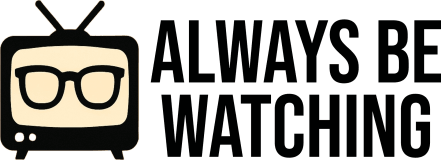

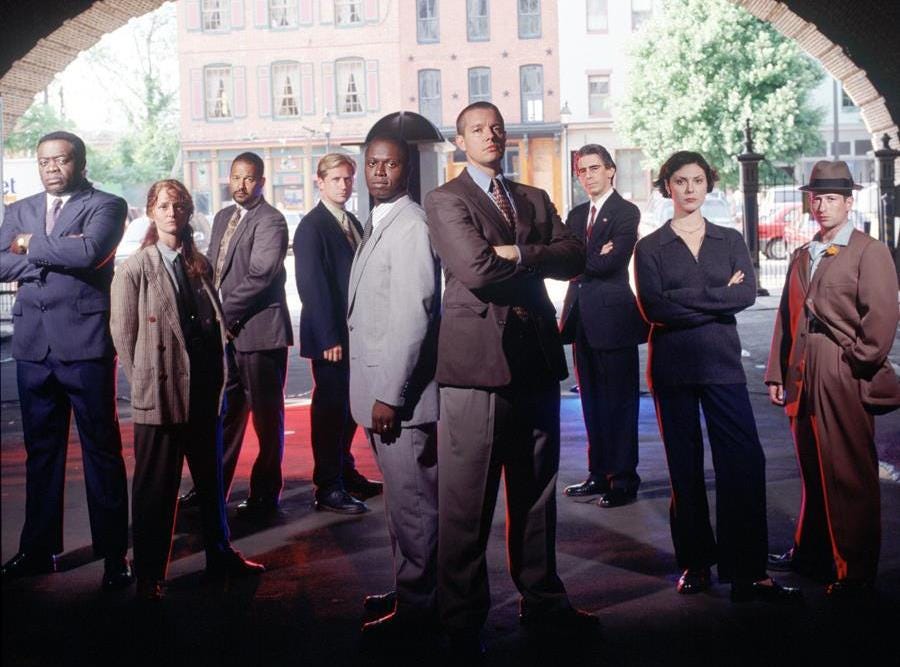
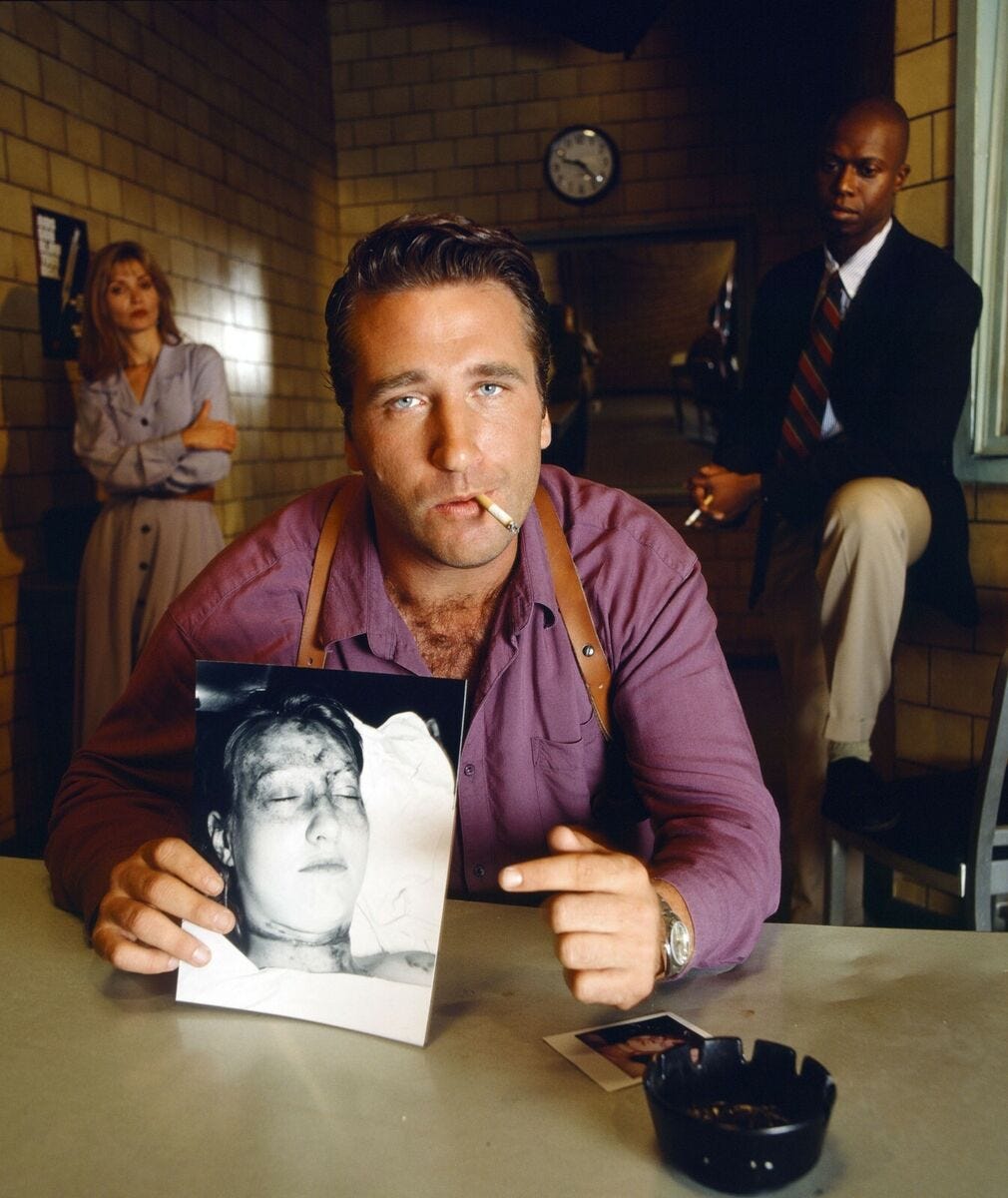

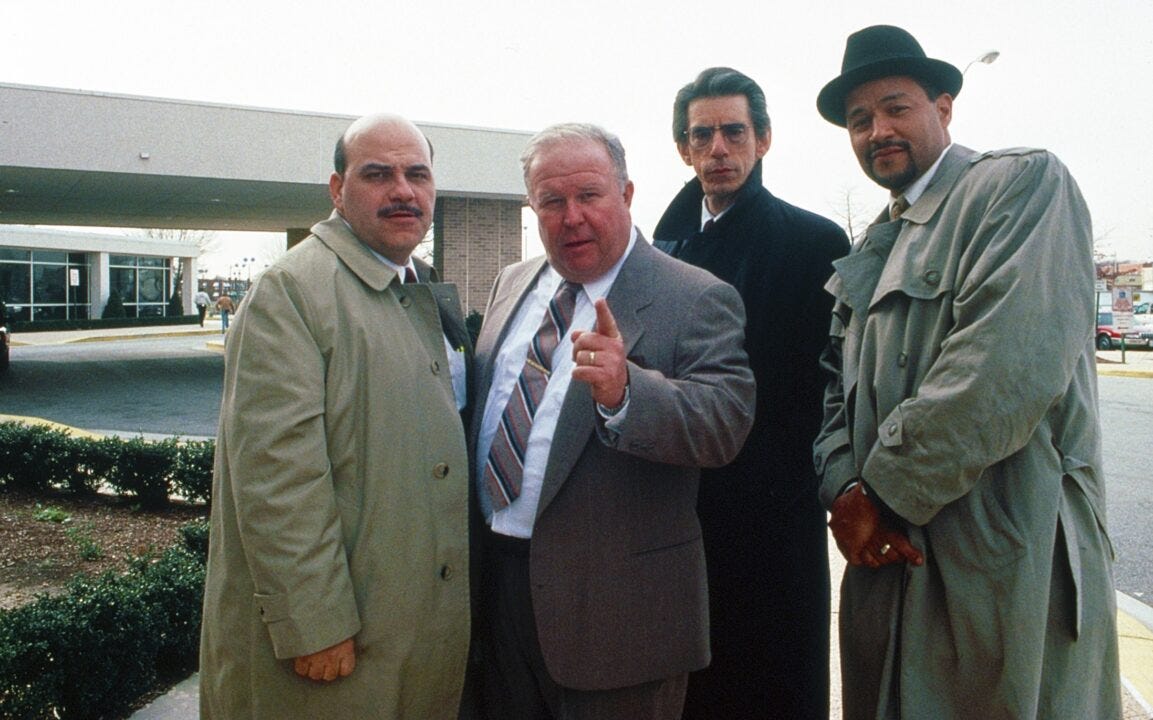

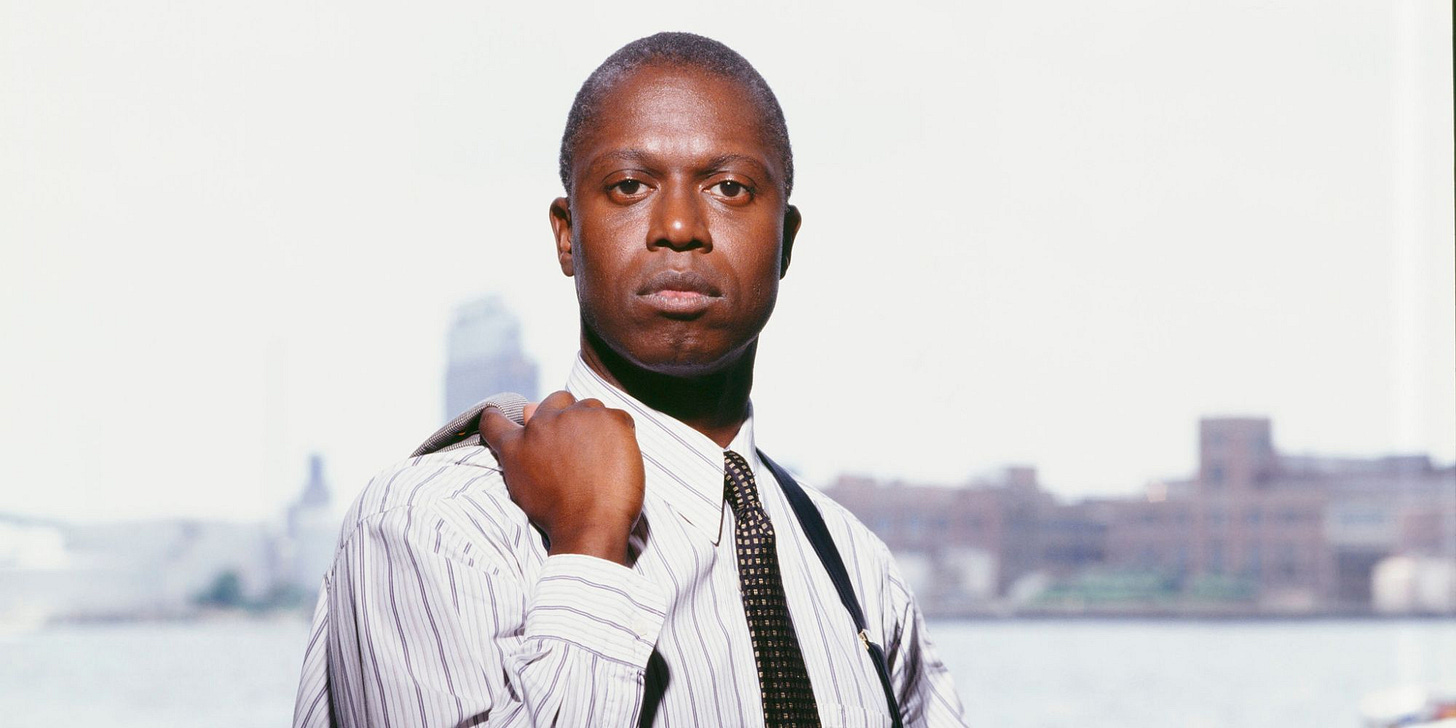
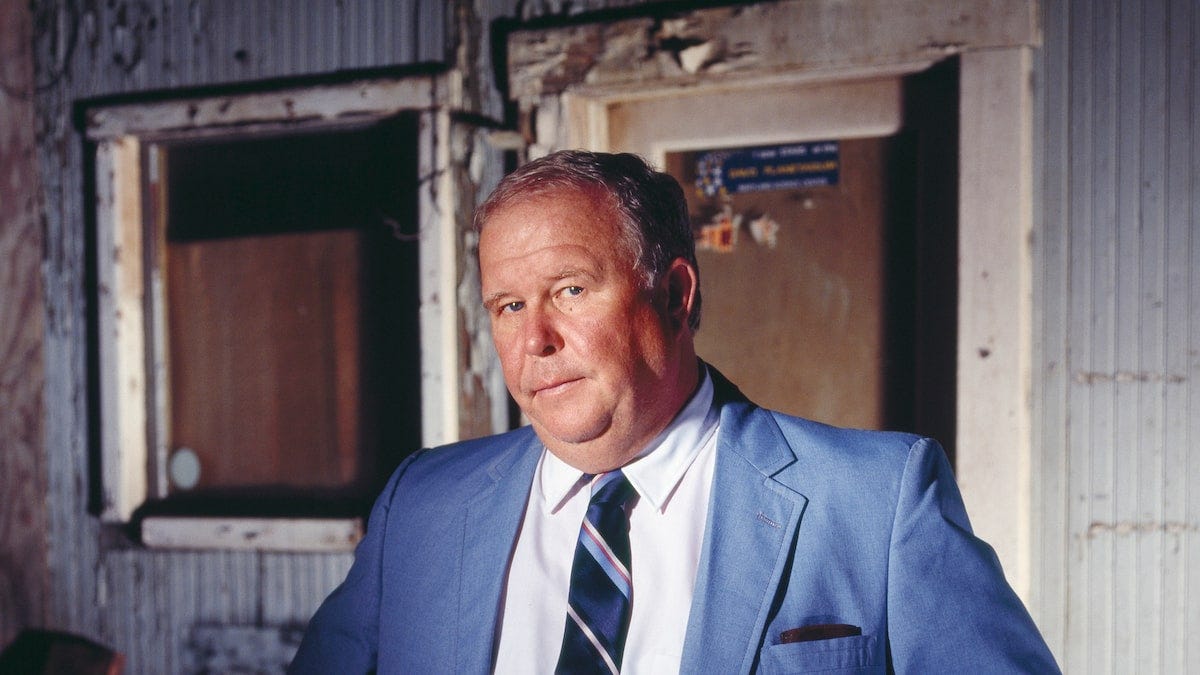
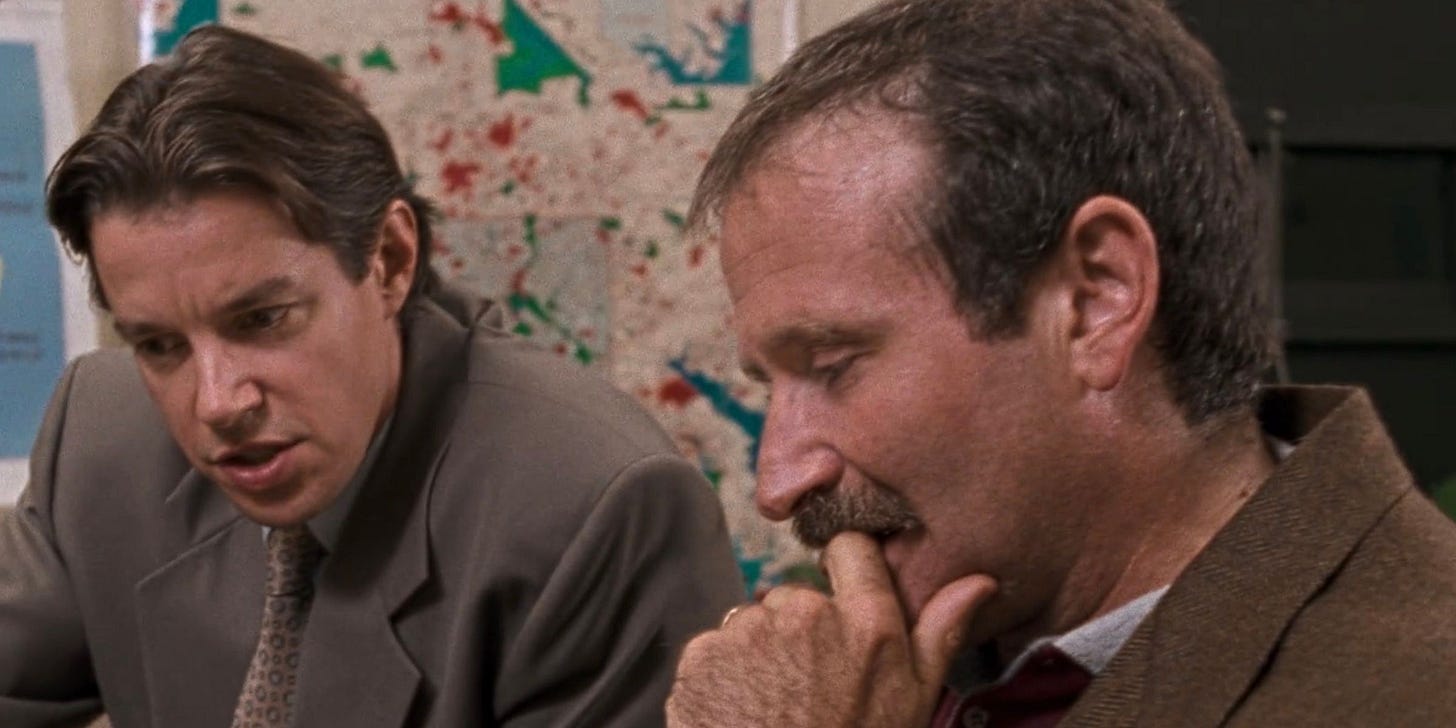

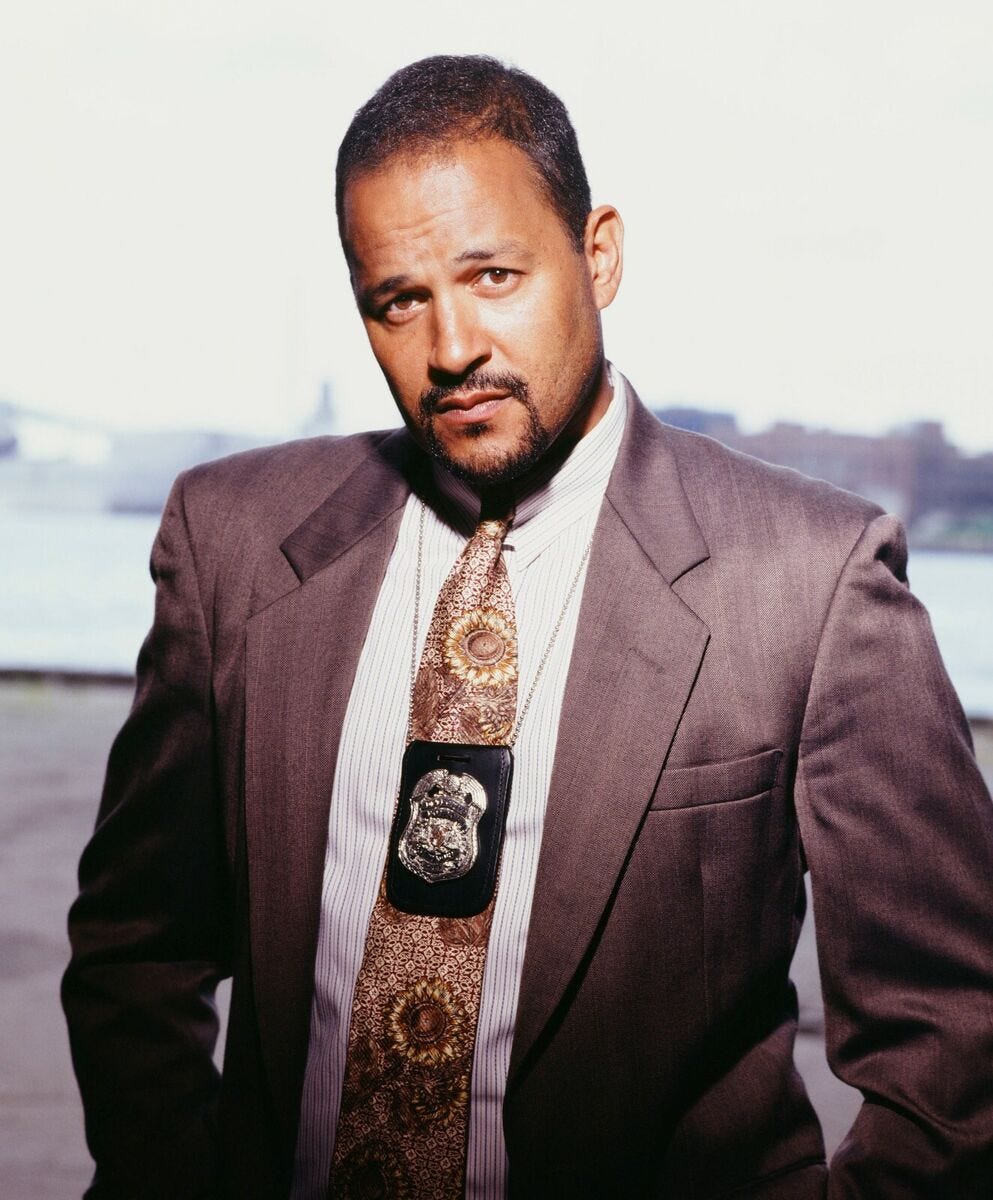
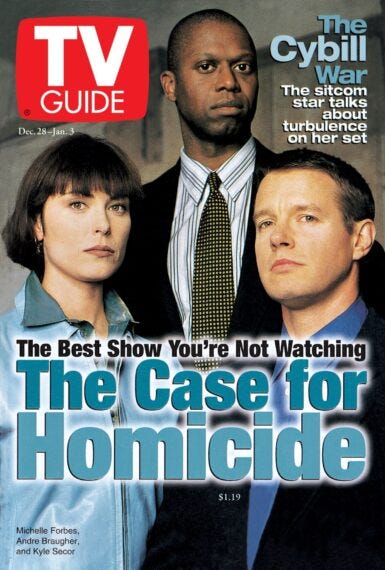

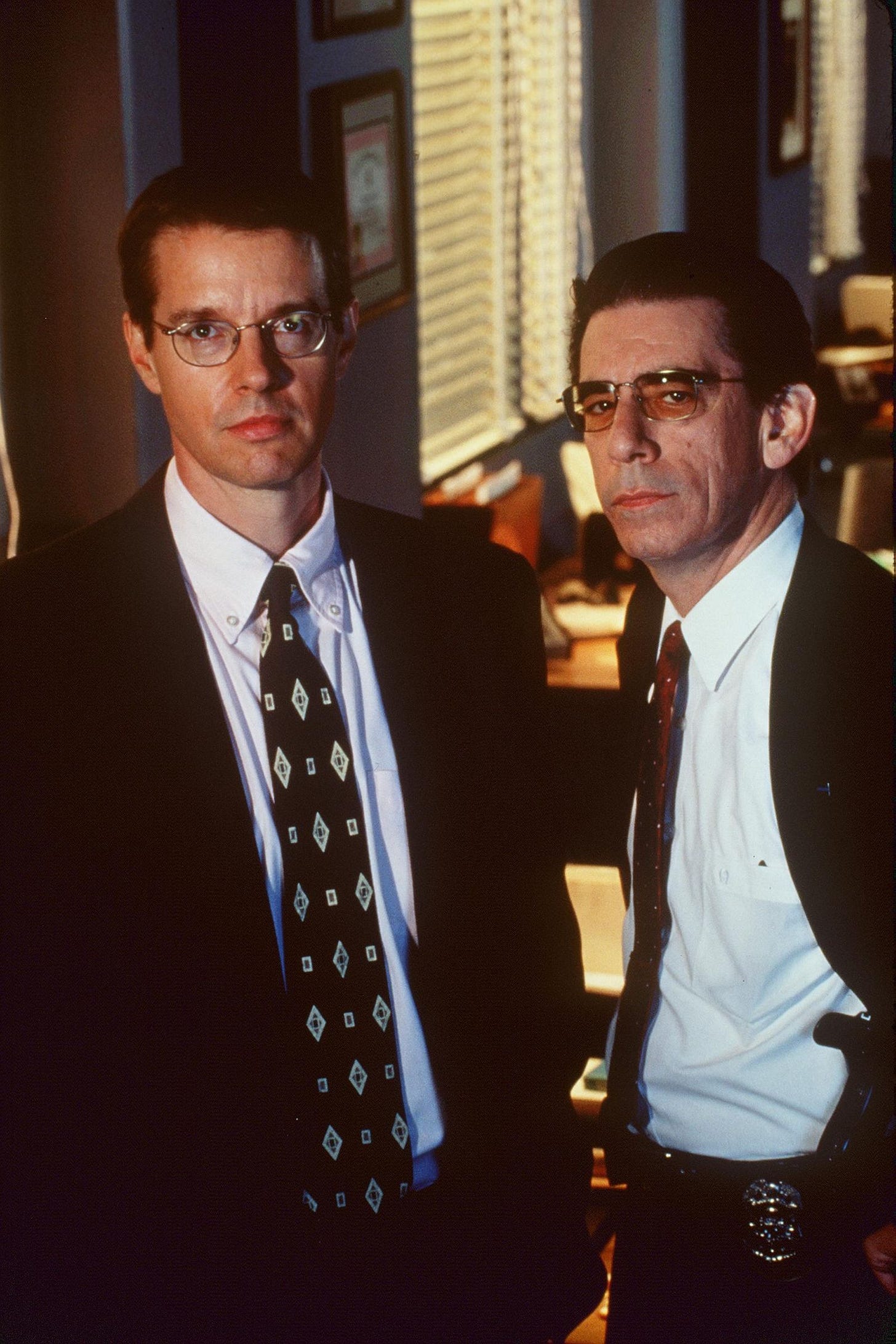

A real pleasure doing this interview. Some great questions and so grateful for your inquisitive nature and love of television! Cheers!
Great interview Dan! I only watched Homicide.. casually when I caught it late on Channel 7 - might be time for an intentional rewatch